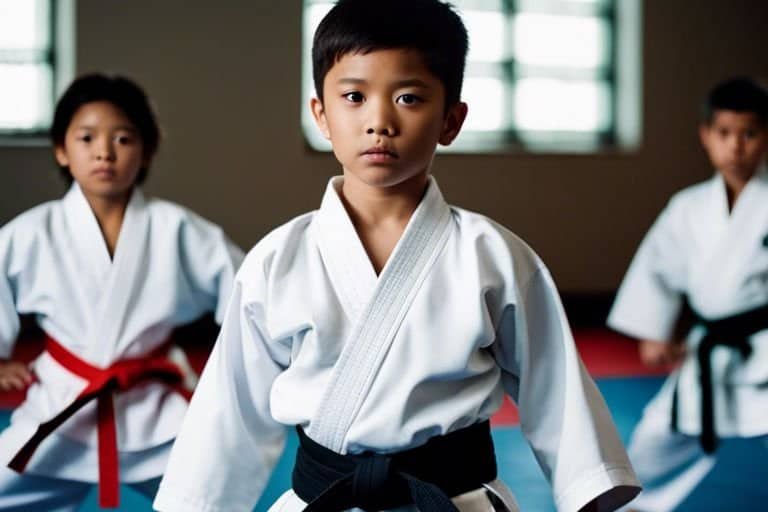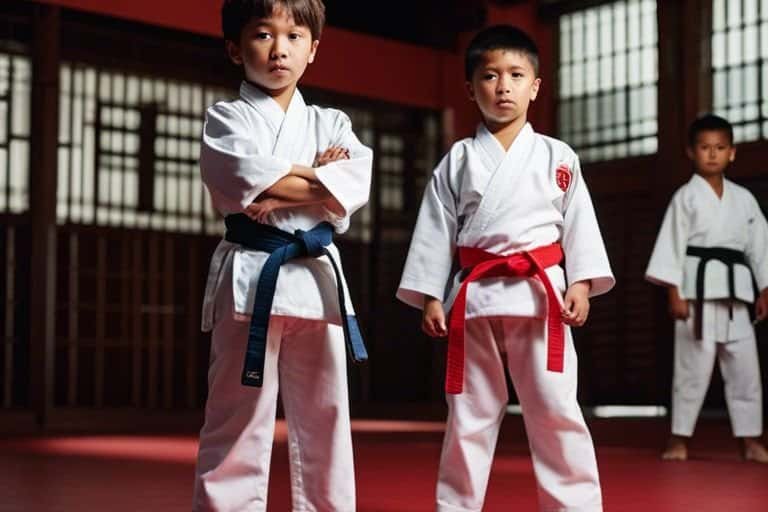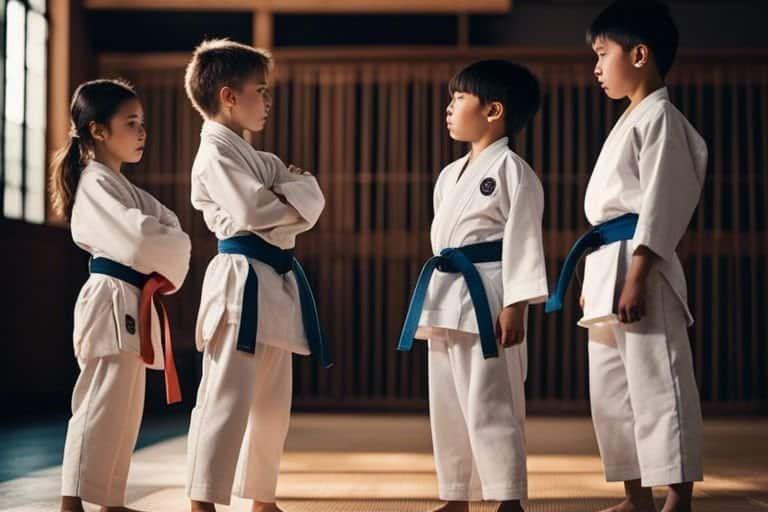Indubitably, karate is an invaluable tool for instilling essential life skills in children. The practice of karate not only helps children develop confidence and discipline, but also teaches them respect and self-control. Through regular training, children learn the importance of perseverance, focus, and determination, which are crucial traits for success in all aspects of life. Additionally, karate equips kids with self-defense skills, empowering them to protect themselves in dangerous situations. In this blog post, we will explore how karate can positively impact a child’s development and provide them with the tools they need to thrive both on and off the mat.
Key Takeaways:
- Confidence: Karate helps kids develop self-confidence through mastering new techniques, facing challenges, and achieving goals.
- Discipline: Martial arts instill discipline in children by teaching them respect, focus, and self-control.
- Physical and Mental Health: Karate classes promote physical fitness and mental well-being, improving kids’ overall health and helping them develop positive habits.

The Foundations of Karate
Some of the most important aspects of karate for kids are its foundational principles and values. By understanding the history and origins of karate, as well as key principles and values, children can truly grasp the significance of this martial art. This understanding helps them to develop discipline, confidence, and respect, which are essential for their personal growth and success.
History and Origins of Karate
To comprehend the essence of karate, it is crucial to delve into its history and origins. Karate originated in Okinawa, Japan, and has its roots in indigenous martial arts and Chinese kenpō. Influenced by the Ryukyu Kingdom, early karate was developed as a means of self-defense and combat. Over time, it evolved into a way of life, emphasizing physical and mental training, as well as self-discipline and respect.
One of the most significant events in the history of karate was its introduction to the Japanese mainland in the early 20th century, leading to its global dissemination. This marked the transition from a local and secretive practice to a popular and respected martial art. Today, karate is recognized worldwide, with diverse styles and schools that continue to honor its rich heritage and traditions.
Key Principles and Values
One of the key principles of karate is the pursuit of continuous self-improvement. Practitioners are encouraged to set and achieve personal goals, both in training and in daily life. Moreover, discipline, respect, and humility are integral values instilled in karate training. Children learn to follow the guidance of their instructors, demonstrate respect towards their peers, and exercise humility in both victory and defeat.
Plus, karate places a strong emphasis on physical and mental strength, agility, and coordination. Through diligent practice, children develop not only their physical capabilities but also their focus, resilience, and determination. These qualities are fundamental not only in karate but also in facing the challenges of adolescence and adulthood.
Karate for Kids: A Path to Empowerment
Clearly, karate for kids is not just about physical movement and self-defense. It is a journey towards empowerment, confidence, and discipline. Through the practice of karate, children not only become physically stronger and more flexible, but they also develop mental fortitude, focus, and respect for themselves and others. The path of karate is a path of self-discovery and empowerment for kids.
Physical Benefits: Strength, Coordination, and Flexibility
Benefits of karate for kids extend beyond just learning the movements and forms. The physical aspects of karate training help children develop strength, coordination, and flexibility. The repetitive movements and techniques in karate help in building muscle strength, improving balance, and increasing flexibility, which are essential for overall physical fitness.
Psychological Benefits: Focus, Respect, and Perseverance
Karate is not just a physical activity, but also a mental discipline. Through karate, kids learn the importance of focus, respect, and perseverance. The constant practice and repetition in karate require the students to maintain focus and discipline, which transfers to other areas of their life.
Plus, the emphasis on respect and perseverance in karate training helps children develop important life skills that will benefit them both in and out of the dojo. These psychological benefits build a strong foundation for the overall development of a child’s character and confidence.

Getting Started with Karate
Now that you’ve made the decision to enroll your child in karate, it’s time to take the first steps in their martial arts journey. Getting started with karate involves finding the right dojo, obtaining essential gear and equipment, and preparing your child for their first class. These initial steps will set the foundation for a successful and fulfilling experience in karate.
Choosing the Right Dojo for Your Child
Right from the beginning, it’s crucial to find a reputable and experienced dojo that focuses on teaching karate to children. Look for a dojo with certified instructors who have experience working with kids and creating a safe, supportive environment. Visit potential dojos to observe a class, speak with the instructors, and ask about their teaching philosophy and approach to working with children. It’s important to choose a dojo where your child feels comfortable and motivated to learn.
Essential Gear and Equipment
Karate requires minimal gear and equipment, making it an accessible martial art for kids to start learning. The essential gear includes a karate uniform (gi), a belt corresponding to their rank, and optional sparring gear for advanced students. Many dojos offer their own branded uniforms for purchase, which ensures consistency and uniformity among students.
With a focus on safety and discipline, sparring gear such as protective headgear, gloves, and shin guards are recommended for students as they progress to higher levels and engage in controlled sparring activities. Investing in good quality gear will provide the necessary protection and support for your child as they advance in their karate training.
Preparing Your Child for the First Class
To ensure a smooth transition into karate classes, it’s important to prepare your child both mentally and physically. To alleviate any nerves or uncertainties, talk to your child about what to expect in their first class, from the basic structure of the class to the etiquette and rules of the dojo. Encourage them to approach the experience with an open mind and a willingness to learn, setting a positive mindset for their martial arts journey.
Plus, make sure your child is dressed in their karate uniform and arrives on time for their first class. Being punctual and dressed appropriately shows respect for the martial arts discipline and sets the tone for a focused and disciplined training environment.
Nurturing Growth and Development Through Karate
For children, the practice of karate goes beyond physical activity. It serves as a tool for nurturing growth and development, instilling essential life skills that will benefit them well into adulthood. Through the practice of karate, children can develop valuable attributes such as discipline, confidence, and resilience, shaping them into well-rounded individuals.
Setting Realistic Goals and Milestones
One of the key components of nurturing growth and development through karate is the process of setting realistic goals and milestones. This practice teaches children the value of hard work and perseverance as they strive towards achieving their objectives. Whether it be mastering a new technique or advancing to the next belt level, the sense of accomplishment derived from reaching these milestones can significantly boost a child’s confidence and self-esteem.
Moreover, the journey towards these goals encourages children to develop a strong work ethic and resilience, characteristics that will benefit them in all aspects of their lives.
The Role of Competitions and Gradings
To further nurture growth and development, competitions and gradings play a significant role in a child’s karate journey. These events provide opportunities for children to showcase their skills and receive recognition for their hard work and dedication. Additionally, the process of preparing for competitions and gradings instills a sense of focus and determination, as children strive to perform their best and demonstrate their progress.
Development in karate also helps children understand the importance of sportsmanship, as they learn to both celebrate their achievements and gracefully accept setbacks, fostering a balanced and resilient mindset.
Encouraging Practice at Home
To solidify the growth and development nurtured through karate, practice at home is highly encouraged. Consistent practice outside of regular classes allows children to reinforce their skills, build muscle memory, and further develop their techniques. Additionally, practicing at home provides an opportunity for parents to engage with their children, showing support and encouragement for their martial arts journey.
Nurturing growth and development through regular practice at home not only helps children progress in karate but also teaches them the value of dedication, effort, and perseverance in pursuing their goals.
To wrap up
Now that we have explored the benefits of karate for kids in building confidence and discipline through martial arts, it is evident that the practice provides a holistic approach to personal development for children. The physical and mental discipline acquired through karate not only helps children learn self-defense techniques but also instills important life skills such as focus, respect, and determination. As parents and educators, it is important to recognize the value of martial arts in shaping the character and confidence of young learners, and consider incorporating it into their development programs.
FAQ
Q: What age is suitable for kids to start learning karate?
A: Children as young as 4 years old can begin learning karate. Many dojos offer specific classes tailored to the needs and abilities of young children.
Q: How can karate help kids build confidence?
A: Karate teaches kids to set and achieve goals, overcome challenges, and perform under pressure, all of which contribute to increased self-confidence.
Q: What discipline benefits can kids gain from learning karate?
A: Karate emphasizes discipline through the practice of bowing, following the sensei’s instructions, and adhering to the dojo’s rules and etiquette, instilling a sense of respect and self-control in kids.
Q: Is karate safe for kids to learn and practice?
A: When taught by qualified instructors in a safe and controlled environment, karate is a safe activity for kids. It promotes physical fitness, coordination, and agility while minimizing the risk of injury.
Q: What can parents expect their kids to achieve through learning karate?
A: Parents can expect their kids to develop not only physical martial arts skills, but also improved focus, better behavior, self-defense abilities, and a deeper understanding of respect and courtesy.



